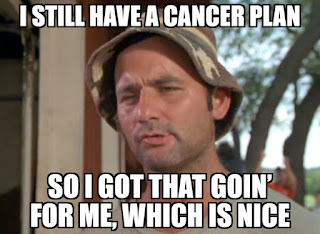Even though Covid has been the main medical headline for the last year or so, other serious health issues are still leading to more deaths. Heart disease, for example, is the leading cause of death in the United States, and as Covid deaths continue to decrease due to vaccines, strokes and cancer will remain near the top of the list as well.
Many times on this blog I have discussed the importance of a cancer insurance plan. Cancer, which comes in many forms and can be specific to one organ or another, is recognized by many when the topic comes up. And even though we all know that heart disease and cardio vascular issues prevail, we don't discuss them as much as cancer.
Part of this is because for many people, avoiding these health problems is a matter of changing one's lifestyle, diet and fitness goals. Making those changes, like eating less pork, drinking less alcohol and going for a walk tend to cut into our wants and needs. And it can seem as if it interferes with our work day. Of course, stress is a leading factor in all of this.
Yet we see and hear about heart attacks and strokes all the time. Think of all the commercials on TV for medicines that can reduce your chance of a heart attack or stroke.
The effects of a major health event can be long lasting. Physically, one can expect to be on some sort of medication for the rest of their life after experiencing a heart issue. A stroke can be debilitating and lead to other issues. My mother had a small stroke while undergoing knee replacement surgery. The stroke, which affected some of her motor skills, also kicked her dementia into overdrive. What was previously some age-related memory loss became full-blown episodes.
There is a financial cost to all of this as well. Anyone who has been hospitalized for a cardiovascular disease knows all too well that there will be deductibles, copays, out-of-network cost (just because your hospital may be in the insurance company's network doesn't mean that everyone that works there is in the network!) and other out-of-pocket expenses. This can add up quickly. And believe me when I say this, not everyone wants to contribute to your GoFundMe page. Plus there is the loss of income when someone is out of work as a result of one of these illnesses.
With all of this in mind, it is important to know that there are insurance policies available that help cover these costs. Most of them pay a lump sum amount in the event of a major health issue, like a heart attack or a stroke. We offer several of these plans, including the following:
- Cancer, Heart Attack and Stroke plan. Just as the name implies, this policy will pay you a lump sum of money (you choose at the time of the application) when diagnosed for one of these conditions.
- Critical Illness. These plans also pay a lump sum but have a different array of illnesses. Most include heart attack, stroke, comas, and other major health events, but cancer may or may not be included. Check with your agent to see what they offer.
- Disability Insurance. When people think of disability insurance, they think of someone hurt who is in a wheelchair, but over 85% of all disability claims are from illness, with cancer and heart disease at the top of the list.
Chris Castanes is the president of Surf Financial Brokers, helping people find affordable life, disability, long term care, cancer, accident and other insurance coverages in North Carolina, South Carolina, Virginia, Tennessee and Georgia. He's also is a professional speaker helping sales people be more productive and efficient, and has spoken to professional and civic organizations throughout the Southeast. And please subscribe to this blog!








